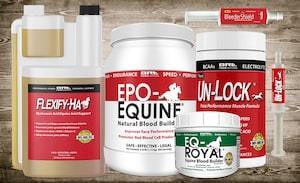
Has your horse ever licked you? Be honest.
Do you know where that tongue has been? Which begs a third question: When was the last time you examined your horse's tongue?
Never, you say? Well, if your horse hasn't had any obvious mouth issues over time, you can relax and enjoy his amorous overtures. But now's probably a good time to consider setting up a routine for regular mouth checks between dental exams.
Just as in humans, tongue issues can signal other problems in a horse's body. Knowing something about your horse’s tongue structure and disorders to look for can help head off or identify more serious problems.
The Horse's Tongue Structure
Take note! Here are some horse tongue anatomy facts:
- The equine tongue rests in the mouth cavity base.
- Fat muscle (made of more than 12 muscles)
- Flat
- Presses against palate
- Movement encourages salivation
- Used for chewing, licking, swallowing
- Contains nerves, blood vessels, salivary glands
But where are the horse tongue function facts? Glad you asked!
The horse tongue is:
- Very sensitive
- Helps support the teeth
- Has a mucus covering
- Inner/back part connected to tissue beneath
- Front part is loose
Tongue Injuries and Typical Causes
Your horse can easily injure his tongue, due to environment, exercise and even curiosity. Here are some common causes:
- Teeth: A horse can bite his tongue when not chewing properly, chewing is difficult, or when teeth are sharp or pointed.
- Falls: A horse can injure his tongue if he falls or even stumbles.
- Bits: Bits that don’t fit properly can injure the tongue; severe rein movement can also injure the tongue.
- Tongue Ties: Often used on race horses to keep the tongue in place.
- Cuts/Lacerations: Horses can be curious and playful; biting or ingestion of unusual objects can cause injuries.
Tongue Symptoms & Disorders
Luckily, in many cases there are symptoms that signal a problem with your horse’s tongue. These include:
- Dropping feed/hay
- Bad breath
- Outstretched/stiff head
Those symptoms could be indicative of one or more of the following:
- Wooden tongue: Signs are lesions, excessive salivation, swollen, painful; treated with sodium iodide.
- Lolling/hanging tongue: Can come from bit evasion or a nerve problem.
- Glossitis: Swollen, possibly discolored tongue, often associated with allergy or laceration
- Purple Tongue: Possibly associated with harsh equipment.
- Red, pale, yellow tongues: Can signal digestive disorders, stress, kidney and bladder issues.
To be safe, check your horse’s mouth/tongue after any uncommon incident or activity, and consult your vet promptly about any changes you notice.
How to Examine a Horse's Mouth
If you rarely or never check your horse’s mouth, you’ll be less likely to discover tongue or other problems before they become painful for both you (in the wallet) and your horse.
Here are some tips to follow when conducting a thorough mouth checkup:
What you need:
- A quiet stall or barn aisle (unlit, away from sun)
- Well-fitted rubber gloves (optional)
- Water hose
- Bright flashlight or headlamp
- Well-fitted halter and lead rope
What to do:
- Tie horse securely or, better yet, have someone hold him.
- If using gloves, put them on.
- Gently open the mouth enough to insert hose; rinse mouth thoroughly.
- Gently open mouth; use flashlight to examine the inside (This is easiest if someone else can hold the flashlight for you while you hold the mouth open. Or wear a headlamp).
What to look for:
- Cuts/lacerations
- Discolored tongue
- Pale/discolored gums
- Swelling
- Lesions/sores
- Sharp teeth/tooth problems
- Lodged food/object
Establish a normal routine to check the tongue and mouth so you can more quickly and economically address abnormal conditions or potential problems, and avoid undue discomfort for your horse.
Then you two can relax and get back to nuzzling.
Top trainers, owners and competitors rely on BRL Equine products to help their horses perform at their very best. You can get the same great results! Our all-natural equine nutritional supplements really work... guaranteed or your money back!





Also in Horse Tips and More
Top 10 Ways to Show Your Horse You’re Thankful For Him
November 01, 2021
View full article →
5 Ways to Prepare Your Barn For Summer
May 03, 2021
View full article →
Your New Spring Horse Health Checklist
March 12, 2021
View full article →